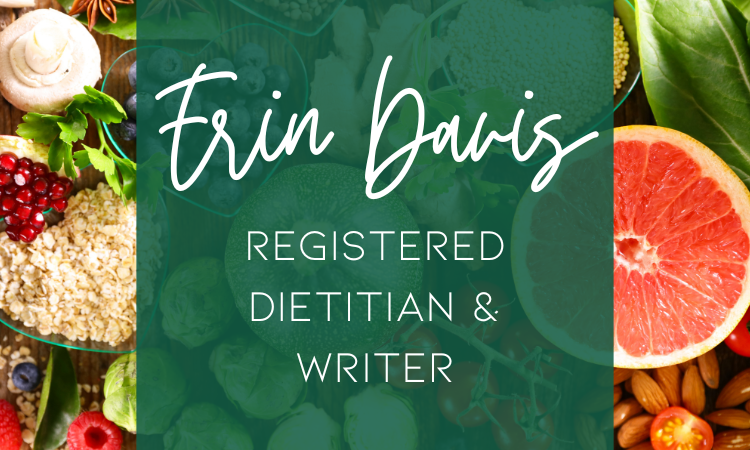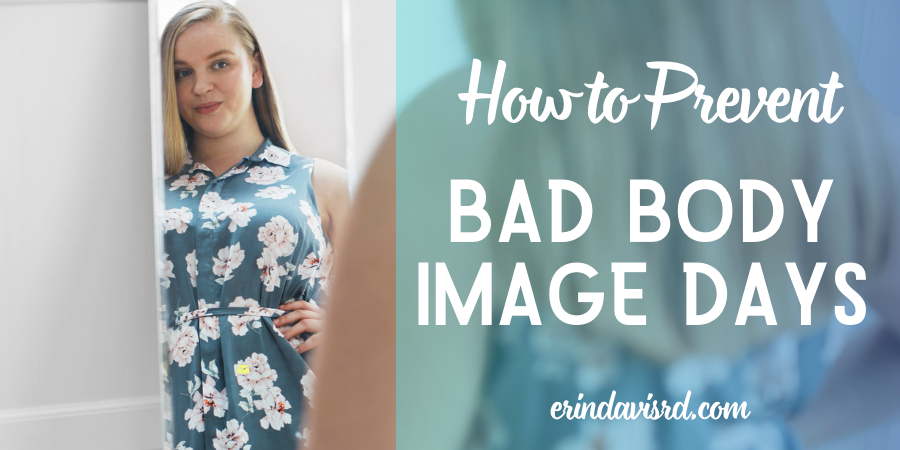We’ve all had them. Days where we feel bloated or disgusted by what we see in the mirror. Those bad body image days can wreck your mood, impact your food intake, and ruin your sex life. Not to mention that our children are watching our every move. If they hear us griping about what we see in the mirror, we’re setting them up for the same troubled relationship with their own bodies that we have.
So what can you do about it? Today I’m sharing some tips to prevent those bad body image days from happening before they even start.
If you’re new around here – hi! – I’m Erin, a registered dietitian and diabetes educator. I believe you can be healthy without weight loss. I help people who are sick of dieting embrace their bodies and make peace with food.
Let’s kick off this blog post with why bad body image days happen to begin with and then what you can put into practice to stop them from happening so often (and you can live your best life!).
Why bad body image days happen
We constantly compare ourselves to others. In our society, thinness is desired. We don’t want cellulite, rolls, or sagging. We want tight, firm bodies. For a long time, I wanted to be at the weight I was in high school. Crazy, right?!
Many moms want their pre-baby bodies back. Guys may desire the muscles they had when they played football. Maybe you want the body you’ve never had but always dreamed of. Whether it’s on social media or in real life, we see bodies we think we want and compare them to our own. This can lead to us feeling bad about the bodies we have.
Another reason for bad body image days is comments from others. While comments about how our bodies look may be well-meaning, they stick with us. For example, if your mom or sibling points out that you’ve gained a few pounds, you may be left with a negative body image.
Perhaps you’ve recently had to weigh in somewhere. Hearing a number that you don’t like can also lead to stress about your body.
Ok – now that we’ve covered why bad body image days happen. Let’s delve into how we can prevent them from happening!
Stop body checking
You’ve conquered your workout and you’re about to hop in the shower. Maybe this is when you look at yourself in the mirror to see if anything has changed. STOP! Step away from the mirror. You must resist the urge. One workout is not going to change your body’s appearance. You’ll just be setting yourself up for disappointment.
Body checking is the habit of scrutinizing your body in the mirror to see progress. It can also be weighing yourself or pinching your stomach or other areas to assess your body.
When I was struggling with my body image in college, I was obsessively posing in the mirror. Very rarely did I walk away with confidence or positivity.
So my first tip is to just stop looking in the mirror. It may seem silly, but if negative thoughts pop into your mind when you see yourself in the mirror, don’t do it.
Sure, you may want to do a quick glance to make sure your hair isn’t sticking up or there isn’t cat hair all over your pants, but make it quick. And don’t do it naked for heaven’s sake.
What to do instead:
Instead of looking in the mirror to see if that workout is making a difference, focus on non-scale victories that are unrelated to body fat. Feeling more energized? Sleeping better? Getting up the stairs without losing your breath?
Just one of the many things I love about exercise is that I feel stronger. I can lift heavy things. And I can squat to catch my kid’s pitches when we play baseball—no bucket needed! There are so many benefits to exercise besides weight loss.
Change up your social media feed
There is a lot of skin that gets widely shown on social media. And while your favorite fitness influencer has likely worked very hard for her six-pack, it may be making you feel bad about your own midsection. Comparison is the thief of joy, so they say.
Unfollow people who portray unhealthy behaviors or make you feel bad about your own body. There are a lot of body positivity accounts that you can follow. But keep in mind that life is SO MUCH MORE THAN OUR BODIES!!
How does social media affect your body image?
We have constant access to the highlight reel of others on social media. It’s the frequent exposure to these images that may be damaging to our body image. If your feed is filled with hard-bodied ladies in their sports bras and leggings, you may think that those bodies are the norm.
But it isn’t normal. Pictures are often posted that are filtered, posed, or altered in some way to optimize their appearance. So it’s likely they don’t even look like that in real life. Even if they do look that way, we can’t assume life is perfect.
Many influencers have come clean and admitted they had an unhealthy relationship with food. When you see women with very little body fat, you don’t know the full picture. Are they still getting a period? Able to get pregnant? Do they feel unsafe around a donut? Obsessed with food? Throwing up after they eat? Maybe working out for 2-3 hours a day?
In addition, social media opens a person up to negative comments about body size and image. People say things they’d never say to a person’s face. Words can definitely leave scars, especially if there were insecurities in the first place.
What to do instead:
- Take a break from social media. Try a social media fast for a week or two and see how you feel mentally.
- Weed through your feed. Are there influencers that are restrictive or body-focused? Unfollow! There are weight-inclusive health and body-positive accounts that you can follow instead.
- Find accounts that have nothing to do with body size. There is so much more to life! I like to follow people who have similar interests and hobbies, like homeschooling, gardening, homesteading, planning, and organizing.
Wear clothes that fit
Maybe the pants that fit you last year are feeling a little snug. Time to retire them. Don’t keep trying to squeeze into them—it will only make you feel uncomfortable. And despite our desire to keep smaller clothes for motivation to lose weight, it doesn’t usually work.
What to do instead:
Find clothes that you feel good in. Get rid of the clothes that don’t feel good. If a brand-new wardrobe is out of your reach right now – I get it! You can slowly add new pieces that fit from your local thrift store or other second-hand places. You can also boost your shopping budget by selling your gotta-go clothes on Poshmark or FB Marketplace.
Check-in on your self-talk
Would you ever talk to your friends or your kids the way you talk to yourself in the privacy of your own brain?
Probably not!
And that negative self-talk, where your worth is tied to a specific number on the scale or on a clothing label, isn’t serving you.
Our bodies are great, and they have SO much worth outside of their sizes. Our bodies fight off illness, birth new life, feed babies, and get us out of bed every day. Try to focus on the good. And if you struggle to be grateful for your body, focus on the good outside your body.
What to do instead:
- Pay attention to your talk – reframe the negative to be neutral at first and then build to reframing to a positive.
- Think about the good in your life. Gratitude does wonders for our mental health. Thank God for the way your body was designed.
- Plan to do some self-improvement that isn’t body related (ie., become more encouraging, volunteer more often, learn a new skill, etc.).
In the end, our body size means nothing. Don’t spend all of your precious mental energy on a negative body image.
That’s a wrap!
While we can’t prevent ALL bad body image days from happening, working on the habits that boost your own self-esteem and uncouple your worth from your weight are worth practicing.
But…they’re so much easier said than done! If you’re ready for some support in improving your body image and relationship with food, know that you’re worth it. I’m here for you. You can have peace with food and enjoy your life—without dieting. Those who work with me find they are able to finally eat the foods they love without guilt.
About the author
Erin is a registered dietitian and diabetes educator with almost 20 years of experience. She specializes in weight-inclusive diabetes care and prevention, intuitive eating, fitness, and women’s health. She works as a consultant and writer in the health and wellness space. Erin is passionate about empowering people to manage their own health and to have peace with food.


